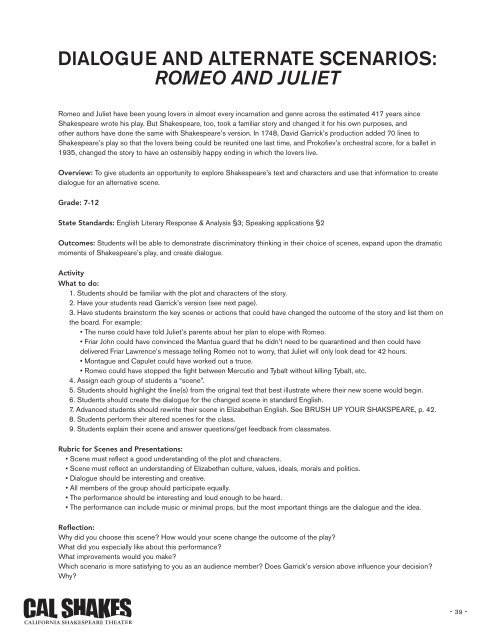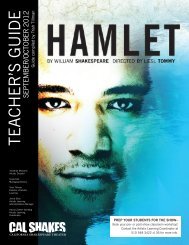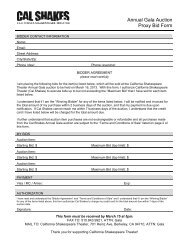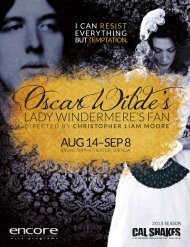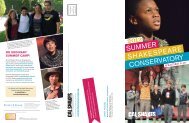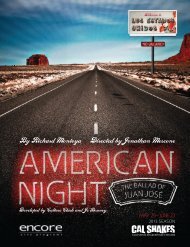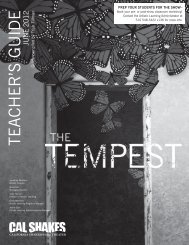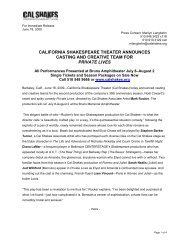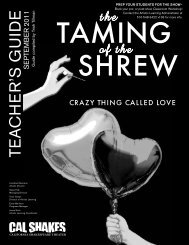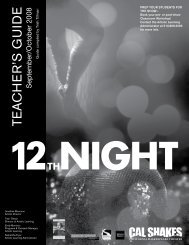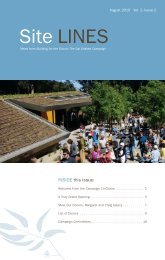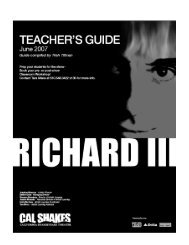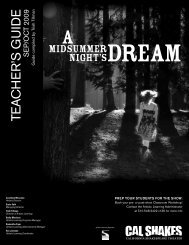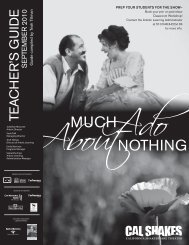Romeo and Juliet teacher's guide - California Shakespeare Theater
Romeo and Juliet teacher's guide - California Shakespeare Theater
Romeo and Juliet teacher's guide - California Shakespeare Theater
You also want an ePaper? Increase the reach of your titles
YUMPU automatically turns print PDFs into web optimized ePapers that Google loves.
DIALOGUE AND ALTERNATE SCENARIOS:<br />
ROMEO AND JULIET<br />
<strong>Romeo</strong> <strong>and</strong> <strong>Juliet</strong> have been young lovers in almost every incarnation <strong>and</strong> genre across the estimated 417 years since<br />
<strong>Shakespeare</strong> wrote his play. But <strong>Shakespeare</strong>, too, took a familiar story <strong>and</strong> changed it for his own purposes, <strong>and</strong><br />
other authors have done the same with <strong>Shakespeare</strong>’s version. In 1748, David Garrick’s production added 70 lines to<br />
<strong>Shakespeare</strong>’s play so that the lovers being could be reunited one last time, <strong>and</strong> Prokofiev’s orchestral score, for a ballet in<br />
1935, changed the story to have an ostensibly happy ending in which the lovers live.<br />
Overview: To give students an opportunity to explore <strong>Shakespeare</strong>’s text <strong>and</strong> characters <strong>and</strong> use that information to create<br />
dialogue for an alternative scene.<br />
Grade: 7-12<br />
State St<strong>and</strong>ards: English Literary Response & Analysis §3; Speaking applications §2<br />
Outcomes: Students will be able to demonstrate discriminatory thinking in their choice of scenes, exp<strong>and</strong> upon the dramatic<br />
moments of <strong>Shakespeare</strong>’s play, <strong>and</strong> create dialogue.<br />
Activity<br />
What to do:<br />
1. Students should be familiar with the plot <strong>and</strong> characters of the story.<br />
2. Have your students read Garrick’s version (see next page).<br />
3. Have students brainstorm the key scenes or actions that could have changed the outcome of the story <strong>and</strong> list them on<br />
the board. For example:<br />
• The nurse could have told <strong>Juliet</strong>’s parents about her plan to elope with <strong>Romeo</strong>.<br />
• Friar John could have convinced the Mantua guard that he didn’t need to be quarantined <strong>and</strong> then could have<br />
delivered Friar Lawrence’s message telling <strong>Romeo</strong> not to worry, that <strong>Juliet</strong> will only look dead for 42 hours.<br />
• Montague <strong>and</strong> Capulet could have worked out a truce.<br />
• <strong>Romeo</strong> could have stopped the fight between Mercutio <strong>and</strong> Tybalt without killing Tybalt, etc.<br />
4. Assign each group of students a “scene”.<br />
5. Students should highlight the line(s) from the original text that best illustrate where their new scene would begin.<br />
6. Students should create the dialogue for the changed scene in st<strong>and</strong>ard English.<br />
7. Advanced students should rewrite their scene in Elizabethan English. See BRUSH UP YOUR SHAKSPEARE, p. 42.<br />
8. Students perform their altered scenes for the class.<br />
9. Students explain their scene <strong>and</strong> answer questions/get feedback from classmates.<br />
Rubric for Scenes <strong>and</strong> Presentations:<br />
• Scene must reflect a good underst<strong>and</strong>ing of the plot <strong>and</strong> characters.<br />
• Scene must reflect an underst<strong>and</strong>ing of Elizabethan culture, values, ideals, morals <strong>and</strong> politics.<br />
• Dialogue should be interesting <strong>and</strong> creative.<br />
• All members of the group should participate equally.<br />
• The performance should be interesting <strong>and</strong> loud enough to be heard.<br />
• The performance can include music or minimal props, but the most important things are the dialogue <strong>and</strong> the idea.<br />
Reflection:<br />
Why did you choose this scene? How would your scene change the outcome of the play?<br />
What did you especially like about this performance?<br />
What improvements would you make?<br />
Which scenario is more satisfying to you as an audience member? Does Garrick’s version above influence your decision?<br />
Why?<br />
- 39 -


